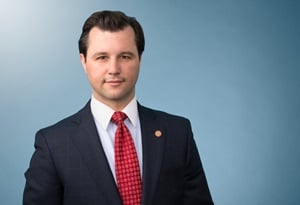Notice & Comment: Snap Reaction to EPA Administrator Scott Pruitt's Speech and the Fate of the Paris Accord
While the world awaits the Trump administration’s decision on the Paris Accord, Environmental Protection Agency (EPA) Administrator Scott Pruitt shared his most extensive public comments to date at Faegre Baker Daniels’ 2017 Energy & Environmental Symposium in D.C. In Episode 4 of Notice & Comment, Del Ehrich, Jim Spaanstra and Max Kelln recapped the highlights of the event and reacted to what it means for businesses, states and the role of the federal government, including the administrator’s vision for reining in regulatory overreach, achieving results, building business certainty, and the United States’ role in climate change.
Reining in Regulatory Overreach
Administrator Pruitt articulated his commitment to doing away with what he considers the agency’s “reimagined authority” and returning to the EPA’s core mission, as authorized by Congress, by focusing on the rule of law, process and respect for federalism. In particular, Administrator Pruitt denounced “sue and settle” tactics, popularized by environmental groups under the prior administration, and regulation by consent decree. Instead, he indicated opportunities to improve decisionmaking under the Superfund program and by strengthening water infrastructure. Although he did not completely shut the door on regulating carbon emissions, he emphasized the “two strikes” already against EPA in attempting to address climate change through regulations.
Building Certainty for Businesses
Pruitt also emphasized that the EPA will seek to more efficiently accomplish its objectives, for example, by finding better ways to meet existing environmental standards before ratcheting down the limits, and by making the permitting process more efficient. He promised a “results-driven” approach to managing the agency, with a goal of creating greater certainty for businesses and direction for the states. Despite many skeptics, Administrator Pruitt believes environmental protection can coexist with economic expansion, and he hopes to seek opportunity for EPA to support economic growth.
Opportunities for Collaboration
As widely reported by many media outlets covering the event, Senate and House staff directors featured on one panel all indicated a commitment to working together on issues where there is common ground, such as rebuilding infrastructure and enhancing the reliability of the power grid. To many in the audience, this could be an opportunity for government and industry to find areas of agreement and move forward to both sustain the environment and speed economic growth, such as through development of clean technology.
What to Watch
After these government leaders’ comments, industry should keep an eye on regulatory initiatives in the EPA and Department of Energy, as little legislative activity is expected in the short term – except perhaps an infrastructure bill. The Superfund Reform Panel announced by Administrator Pruitt and the reexamination of enforcement priorities are a few developments that should be watched closely. Industry should also watch what comes from the President’s executive order and any new Department of Energy policy, which will be closely tied to these environmental issues. Despite challenges, there is optimism about wide bipartisan, bicameral support for an energy bill — even potentially addressing greenhouse gases.
Faegre Baker Daniels’ new monthly podcast, “Notice and Comment: Faegre Baker Daniels Environmental Podcast” showcases attorneys from Faegre Baker Daniels’ offices nationwide and guests as they discuss cutting-edge issues in environmental law. Topics will cover the spectrum of federal and state environmental laws, including the Clean Water Act, Clean Air Act, Endangered Species Act, NEPA, SDWA, CERCLA, RCRA and TSCA – all from a practitioner’s perspective.
The material contained in this communication is informational, general in nature and does not constitute legal advice. The material contained in this communication should not be relied upon or used without consulting a lawyer to consider your specific circumstances. This communication was published on the date specified and may not include any changes in the topics, laws, rules or regulations covered. Receipt of this communication does not establish an attorney-client relationship. In some jurisdictions, this communication may be considered attorney advertising.


